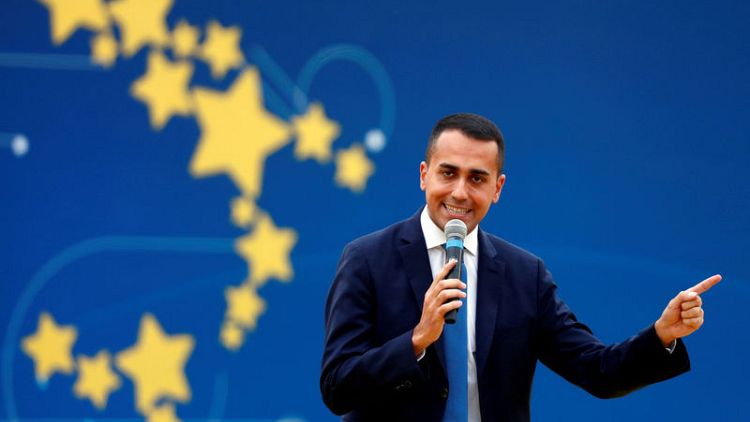By Gavin Jones and Angelo Amante
ROME (Reuters) - The leader of Italy's 5-Star Movement began on Tuesday to try to stem a steady slide in support since the anti-establishment party stormed to power last year, pledging to reconsider some of its hallmarks and founding principles.
5-Star won 33 percent of the vote at the March 2018 ballot, almost double its closest competitor, but in the last year it has shed almost 10 points in opinion polls, been overtaken by its coalition partner, and lost a spate of local elections.
Two days after the latest setback on Sunday in a Sardinian regional ballot, Luigi Di Maio said 5-Star needed more organisation at national and local level and a more similar structure to the traditional parties it has always decried.
"It's clear and obvious that we need to be better organised," Di Maio, who is deputy prime minister in the coalition government with the right-wing League, told a news conference.
He proposed new leadership teams and to scrap 5-Star's traditional refusal to fight elections in alliance with other parties. He also suggested that for local councillors it was time to revisit an internal rule that no member can hold an elected office for more than two terms.
None of the proposals will be adopted before a period of debate among 5-Star's elected representatives and voting by its members on the movement's online platform, he said.
5-Star has been written off many times since it was founded by comedian Beppe Grillo in 2009 as an environmentalist and anti-corruption protest movement, and 32-year-old Di Maio dismissed the idea it was in decline.
"We are alive and kicking and fighting more strongly than ever," he said, pointing out the movement normally fares badly in local votes - it has never won control of any of Italy's 20 regions - only to bounce back at national elections.
PARTY OVERHAUL
However, Francesco Galietti, head of political risk consultancy Policy Sonar, said Di Maio's party overhaul could fuel already-simmering internal infighting.
"His critics will say he is using the defeats to consolidate his grip on power rather than relinquish some of it," he said.
5-Star is penalised in regional ballots by its refusal to form pre-election alliances which often involve dozens of parties and so-called "civic lists" representing local interest groups. In Sardinia there were so many of these that no single party won more than 13 percent of the vote.
Yet aside from electoral tactics, there is no doubt the party is struggling while the League goes from strength to strength under its charismatic leader Matteo Salvini.
"5-Star is an anti-system party which is paying the price of being in government," said Lorenzo Pregliasco, founder of political analysis and polling company YouTrend.
The movement draws support from leftist and rightist voters attracted by its anti-graft, anti-establishment message, but many from the left were dismayed to see it join forces with the hard-right League after the inconclusive 2018 election.
"Its purity was inevitably stained by sharing government with the League," said Galietti.
Pregliasco said 5-Star's policy stances had sometimes seemed "confused" since it came to power, and "it needs to clearly answer the question of what it stands for now it is in government and why people should vote for it".
(Reporting by Gavin Jones, editing by Ed Osmond)
